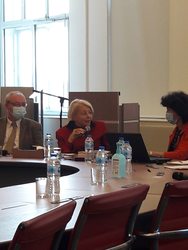🎤Never exclude Judges and Lawyers in Compliance Law ("Ne jamais se passer des juges et des avocats dans le Droit de la Compliance"), in 📅 "Which Judges for Compliance?" (""Quels juges pour la Compliance ?")
ComplianceTech® ↗️ pour lire cette présentation en française, cliquer sur le drapeau français

 Full Reference: Frison-Roche, M.A., Ne jamais se passer des juges et des avocats dans le Droit de la Compliance ("Never exclude Judges and Lawyers in Compliance Law" , in Frison-Roche, M.-A., Morel-Maroger, J. et Schiller, S. (dir.), Quels juges pour la Compliance ("Which Judges for Compliance), Colloquium co-organised by the Journal of Regulation & Compliance (JoRC) and the CR2D of Dauphine University PSL, Raymond Aron Amphy, 23rd September 2021.
Full Reference: Frison-Roche, M.A., Ne jamais se passer des juges et des avocats dans le Droit de la Compliance ("Never exclude Judges and Lawyers in Compliance Law" , in Frison-Roche, M.-A., Morel-Maroger, J. et Schiller, S. (dir.), Quels juges pour la Compliance ("Which Judges for Compliance), Colloquium co-organised by the Journal of Regulation & Compliance (JoRC) and the CR2D of Dauphine University PSL, Raymond Aron Amphy, 23rd September 2021.
____
📅 Read the Colloquium programme
📅 This colloquium is a part in the colloquia cycle organized in 2021 by the Journal of Regulation & Compliance (JoRC) and it partners on the Compliance Juridictionalisation.
____
✏️A bilingual Working Paper on the topic "The role of the Judge in Compliance Law has been prepared to serve a basis for this conference : read this Working Paper
But for the reason detailed below, I preferred to use the time allotted to the introduction of the colloquium to develop rather what should had be an opening element for making it the entire topic of my intervention. : "Never do without judges and lawyers in Compliance Law".
Because before analyzing the role of judges, they still need to be in the Compliance system; this seems to us to be taken for granted, but it is not.
► Conference Summary: Due in particular to the large number of students and the fact that a long time ago when I arrived at Dauphine University I had created a Master in Economic Law with Martine Lombard in which I had included a course of "Economic Procedural Law" that I was teaching, since it was the moment to make this Colloquium "general introductory report", I therefore preferred to go further and focus the subject on something other than "The role of the judge in Compliance Law" , namely the very question of "the presence of judges and lawyers in Compliance Law".
This question of their presence or their absence, because they would be useless, even harmful to the Compliance effectiveness, either judges, or lawyers, or both together, is indeed the prerequisite for the reflection of " Which judges for Compliance? " because if we think of Compliance exclusively through the Ex Ante and efficiency, as it is often done in the West through artificial intelligence or in China in a system of surveillance and economic, technological and political efficiency , there is neither judge nor lawyer. It is therefore to this prerequisite that I devoted my speaking time, deferring to publication all the analyzes that I had prepared on "The role of the judge in Compliance Law", to which everyone can refer by consulting the preparatory work.
It is indeed imperative to always keep in mind the need to never exclude Judges from Compliance systems, although this can be conceivable since they are Ex Ante mechanisms, which often aim by nature to avoid the trial. (example of the Deffered Prosecution Agreement), because when there is a judge, the procedural mechanisms and Due Process principle are associated with it: the power of Compliance Law does not go wrong.
However, Compliance Law is the Law of the future, that which will seize the immense challenges to be resolved today for tomorrow and it is not from the specific laws against corruption, such as FCPA or the French law known as "Sapin 2 law", which are only examples, but from two enormous "monumental" subjects that are on the one hand Data and on the other hand Climate that Compliance Law is building, with the means that are required. But so that the rule "all the means necessary for the ends", which already tended to govern Regulatory Law of which Compliance Law is the exponential extension, does not carry all, one needs lawyers. Because the lawyers contradict. And ask. Ask judges and carry the actions of ordinary people for their subjective rights to be shaped. As Motulsky affirmed it in its thesis, written during the Second World War, before after this enormous systemic disaster inventing the "general procedural law".
____
The Working Paper which had not be exploited during the conference will be the bais for the article in the book :
📕 in its French version La juridictionnalisation de la Compliance, in the Series 
📘 in its English version Compliance Jurisdictionalisation, in the Series 
___
📅 Ce colloque s'insère dans le cycle de colloques 2021 organisé par le Journal of Regulation & Compliance (JoRC) et ses partenaires autour de la Juridictionnalisation de la Compliance.
_________
comments are disabled for this article